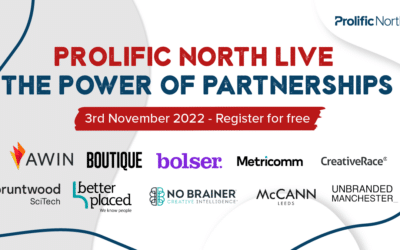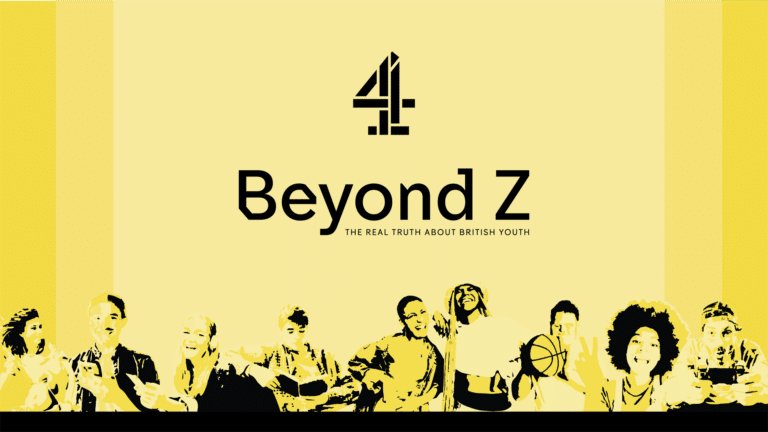Channel 4 has offered some hints of what may be to come, for the world and the broadcaster itself, following its extensive Beyond Z: The Real Truth About British Youth study, which quizzed more than 1,500 young people aged 13-24 across the UK.
The research aims to provide a detailed insight into what it is like being a young person living in Britain today, in the process determining what they need from a national broadcaster and ensuring close links between the channel and forthcoming generations for the cultural, and presumably commercial, benefit of both parties.
Speaking at a preview event livestreamed on LinkedIn this morning, Channel 4 CEO Alex Mahon said: “Our existence as a public-service broadcaster depends on our relationship with younger people and always has. Just like those different generations that have grown up with us over four decades, we need to adapt and change constantly.
“Older generations – those that grew up as Channel 4 grew up in the 80s and 90s – were the last of 500 years of people whose world view was shaped by Gutenberg and the printed word. Gen Z live in a Google world – video-first search; the algorithmic selection of their informational and entertainment diet; an agenda of influence that derives from unimaginably large numbers of invisible connections across an unseeable network. Our social norms are in flux: it is too early to say what normal behaviours or boundaries will settle to.”
That all sounds simple enough, then. Thankfully, more is sure to be revealed with the launch of the full report at the end of November, and further live events in Leeds and Manchester to break down the findings with key advertisers, industry partners and stakeholders.
In the meantime, Channel 4 has helpfully broken down its key findings into four main lessons to whet our appetites:
Don’t Mind The Generation Gap
There is far less conflict between generations than is often claimed. To a degree, the intergenerational conflict that we read so much about is a myth. Three out of five 13-24s see their parents as role models, a quarter point to a grandparent and about the same proportion identify a teacher. Big societal issues like gender equality, climate change and human rights are seen as shared values – in other words, the collective responsibility of society, not the failings of older generations.
Where Gen Z are certainly more progressive than older generations is on ‘emergent’ social issues, particularly support for the Black Lives Matter movement and transgender rights, it is arguable that they are no more divisive than anti-racism or gay rights were 40 years ago, just spread more widely by ubiquitous digital discourse.
The Rise of the YIPs – Young Illiberal Progressives
The social and cultural attitudes of Gen Z are in reality more similar to older generations than stereotyped judgments suggest. These are progressive people in that they support the freedoms won by earlier generations who changed social attitudes towards issues such as sexuality and equality. Indeed, they are significantly more progressive than their parents and even than millennials on some issues, for example, only 48 per cent of Gen Z believe there are just two genders, compared to 68 per cent of over-25s.
But, and it is a big but, young people could be said to be less liberal because they are less tolerant of the views of others than their parents and grandparents – surely a novelty. A quarter of Gen Z say they “have very little tolerance for people with beliefs that they disagree with”. They don’t believe in unrestrained free speech, with nearly half agreeing that “some people deserve to be cancelled”.
There is an obvious paradox between this intolerance and their genuinely stated desires for everyone to have their rights and freedoms defended. This is probably a completely rational response to the confusing online world in which they live, but is it either what they want for themselves or what those who love them want on their behalf?
The new stress, just like the old stress
On the one hand a generational divide does exist in attitudes to social media. Born into a world of constant connectivity, Gen Z believes its elders do not understand their ability to control interaction on social media.
Yes, they report significantly greater struggles with mental health, but their concerns are not so much about social media, which their elders often blame. Indeed, this is the biggest intergenerational issue the study uncovered. Over-25s believe social media is the top cause of stress in the lives of Gen Z – 50 per cent of them say so. But ask the young Britons themselves and only 35 per cent identify it as a cause. For them, it isn’t even in the top five stated drivers of stress.
Those are: the cost of living, a lack of affordable housing, uncertainty about the future, pressure to be successful and feelings around appearance. If you look hard at those, the first is food, the second is shelter and the last three are about your relationships with others and what mark you leave on the world. Food, shelter, legacy: the same worries and priorities of people who have lived on these islands not just for generations or centuries, but millennia.
Social media bugs Gen Z, of course; young people understand it can have both a positive and negative impact on their personal image or their happiness. But they don’t see it as a major cause of poor mental health because they believe they have the power to turn it off and on. Ultimately, their view is that being employed in a fairly-paid job and owning a house is more likely to drive their happiness than what they’re seeing on TikTok.
Big picture pessimists; little picture optimists
While they have understandable concerns about the future of the world – with climate-emergency, economic mayhem and international violence impacting the planet today and tomorrow – this cohort of young Britons see themselves as part of the solution, with 60 per cdent being positive about their own future.
The big question again, is how we – who are not part of their generation – judge the quality of their lives, particularly on the issue of the connected world’s impact on them. From outside, it looks profound and scary – one where young people today need to edit, curate and broadcast their own experience. Undoubtedly, there are real and worrying trends in the mental health of young people – it is a true generational effect and the negativity of a 24-hour news agenda can add to a sense of permacrisis.
Covid also made everything worse. We know there are problems with body image affecting boys and girls, though in different proportions and different ways, but there is another picture, different from what you might glean from media headlines: we found that 44 per cent of Gen Z said they had been helped to accept their body as it is by information or images they found online, almost exactly the same proportion as said the opposite.
The same number say they are fully aware that images online are manipulated to give false impressions. We found that there are worrying numbers of negative effects that Gen Z has felt: eating disorders, over-exercising, taking diet pills or steroids that may involve as much as four in 10 of this generation.
But they do – or at least some of them do – have self-control: one in five say they have paused their social media use to protect their mental health and one in nine have given it up permanently.
Perhaps the biggest finding in this area is that young people believe that their elders project their own dislike of the online world onto the activities of their children. Almost 60 per cent think older generations worry unnecessarily about it and underestimate the resilience of Gen Z.














